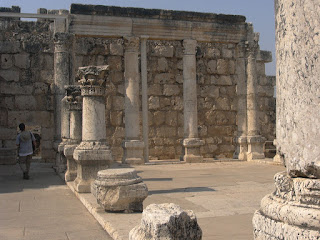Readings:
Genesis 9-11
Matthew 4
Covenant is sort of a big deal in Genesis. "Covenant" means a contract, a relationship between God and humanity. We are not equal partners in the contract, however. We're only in it by God's grace. We never earn our share of the covenant.
You normally think of Abraham when you think of God establishing the covenant, but first it is established with Noah.
And the first thing Noah does after the covenant?--He goes out and drinks too much wine. Alas.
We then have the "table of the nations", where it is explained how all of the different countries were created. This leads in to the Tower of Babel.
I love this story.
On one hand it seems strange to us. Wouldn't God want people to "speak the same language" (whether literally or metaphorically) and work together?
But, when people all speak the same language, they don't work to solve the world's problems, they build a monument to themselves.
So God scatters and confuses their words.
Consider that multiple languages and cultures are God's intention. How does that change the way we view the "other"?
Matthew 4
Temptation of Jesus in the wilderness--note that Satan (which is Hebrew for "the accuser") tempts Jesus, and it is about the appropriate use of power, and about authority. It also shows that knowledge of Scripture helps Jesus through the temptation.
Then John the Baptizer is arrested and Jesus starts proclaiming what John had already proclaimed, "repent, for the kingdom of heaven has come near". "Kingdom of Heaven" is Matthew's term for "Kingdom of God" that is used in other gospels.
Jesus, at this point, moves away from both the wilderness and the big city of Jerusalem and heads to Capernaum, a sleepy fishing village on the NW coast of the Sea of Galilee.
It is at this point in Matthew's Gospel that Jesus calls his disciples. Imagine being a fisherman in a backwoods town, when Jesus shows up and calls you to fish for people.
Would Christianity have been different if Jesus had called his disciples from Jerusalem or New York City or Tokyo?
Subscribe to:
Post Comments (Atom)



My favorite analogue to the tower of Babel is a passage from the Quran that says God "made you into nations and tribes that you may know one another". Obama actually used it in his speech in Cairo Thursday.
ReplyDeleteThere are infinite facets of God, and only through expreiencing a multitude of these facets can we glimpse a tiny fraction of his glory.
I think you're right, Brian. Tomorrow is Trinity Sunday, and I think that is one reason why God is triune--a better way to get a glimpse of the fullness of God.
ReplyDeleteGood point! Ken Wilber discusses "the three faces of God": 1st person, 2nd person and 3rd person. Neglect one and our perception of the Divine is distorted.
ReplyDelete